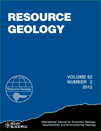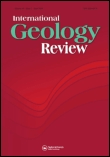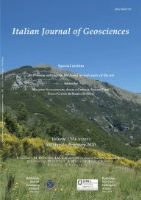
Bulletin of the Mineral Research and Exploration
Scope & Guideline
Advancing Knowledge in Geology and Engineering
Introduction
Aims and Scopes
- Geological Research and Characterization:
The journal publishes studies that explore the geological formations, stratigraphy, and mineralogical characteristics of various regions, particularly in Türkiye, providing insights into their formation processes and resource potential. - Geophysical and Geochemical Investigations:
Research involving geophysical methods (e.g., seismic, gravity, magnetic) and geochemical analyses to assess mineral resources, environmental impacts, and geological hazards is a core focus. - Hydrogeological Studies:
The assessment of groundwater resources, including quality and potential mapping using GIS and remote sensing techniques, is a significant area of research, reflecting the importance of water resources in semi-arid and arid regions. - Paleoecological and Archaeological Insights:
The journal also emphasizes studies that integrate geological data with paleontological and archaeological findings, providing a broader understanding of historical geological events and their impact on human civilization. - Tectonic and Seismic Analysis:
Investigations into tectonic movements, earthquake occurrences, and the structural analysis of fault zones are prevalent, contributing to the understanding of seismic risks and geological stability in various regions.
Trending and Emerging
- Geothermal Energy Research:
There is a growing emphasis on geothermal energy studies, particularly in relation to the geothermal potential of various regions in Türkiye. This trend reflects the increasing importance of renewable energy resources and sustainable practices in geological research. - Advanced Remote Sensing and GIS Applications:
The integration of advanced remote sensing techniques and GIS for geological mapping, resource assessment, and environmental monitoring is a prominent trend, highlighting the journal's alignment with modern technological advancements in geology. - Archaeoseismology and Historical Geology:
Emerging interest in archaeoseismology, which studies the relationship between geological events and human history, indicates a trend towards interdisciplinary research that combines geology with archaeology and anthropology. - Hydrogeological Modeling and Water Resource Management:
Research focusing on hydrogeological modeling and integrated approaches to water resource management is gaining traction, particularly in the context of semi-arid regions, reflecting a growing concern for sustainable water practices. - Neotectonics and Active Tectonic Studies:
There is an increasing focus on neotectonic studies and the investigation of active tectonics, which are crucial for understanding earthquake risks and geological hazards, thus highlighting the relevance of this research in today's context.
Declining or Waning
- Traditional Mineral Exploration Techniques:
There is a noticeable reduction in papers focusing solely on traditional mineral exploration methods, such as basic geological mapping and simple sampling techniques, as the field shifts towards more integrated and advanced methodologies. - Low-Impact Environmental Studies:
Research that solely focuses on low-impact environmental studies without integrating advanced technological approaches or comprehensive assessments is becoming less common, suggesting a shift towards more robust and impactful environmental research. - Static Geological Assessments:
Papers that present static assessments of geological formations without dynamic modeling or consideration of geological processes over time are less frequently published, indicating an evolution towards more comprehensive and process-oriented research.
Similar Journals

Acta Geodynamica et Geomaterialia
Pioneering Research in Geological and Material BehaviorActa Geodynamica et Geomaterialia is a well-regarded journal published by the Academy of Sciences of the Czech Republic, Institute of Rock Structure and Mechanics. Since its inception in 2004, this journal has established itself as a vital resource within the realms of Geology, Geophysics, and Geotechnical Engineering, categorized in the Q3 quartile across these fields as of 2023. With a focus on innovative research that addresses complex Earth dynamics and material behavior, it provides a platform for scholars and professionals to disseminate their findings and foster academic discourse. The journal holds an important position in the academic landscape, particularly for those engaged in interdisciplinary studies bridging geology and engineering. Although it is not an open access publication, its content remains pivotal for advancing knowledge and practices within these areas, making it an essential read for researchers and students alike. The journal's operational address is located in the vibrant city of Prague, Czech Republic, further enriching its academic character.

Visnyk of Taras Shevchenko National University of Kyiv-Geology
Pioneering Research in Earth Sciences from the Heart of UkraineVisnyk of Taras Shevchenko National University of Kyiv-Geology is a premier academic journal dedicated to advancing the field of geology and related earth sciences. Published by the esteemed NATL TARAS SHEVCHENKO UNIV KYIV, this journal serves as a vital platform for researchers, professionals, and students to disseminate original research findings, innovative methodologies, and comprehensive reviews that address contemporary geological challenges. With an ISSN of 1728-2713 and an E-ISSN of 2079-9063, the journal is committed to upholding rigorous academic standards and excellence, although it currently operates without an open access model. The Visnyk primarily focuses on topics such as mineralogy, geophysics, geological engineering, and environmental geology, thus providing a broad spectrum of insights into the ever-evolving discipline of geology. Situated in Kyiv, Ukraine, it not only fosters local research but also contributes to the global geological discourse, making it an indispensable resource for anyone engaged in earth sciences.

RESOURCE GEOLOGY
Advancing Knowledge in Geology and Resource ManagementRESOURCE GEOLOGY, published by WILEY, is a peer-reviewed journal that serves as a vital platform for the dissemination of innovative research in the fields of geology and geochemistry. With an ISSN of 1344-1698 and e-ISSN 1751-3928, the journal has steadily contributed to the academic community since its inception in 1996, continuing through its planned convergence in 2024. With a Q3 ranking in both Geochemistry and Petrology and Geology categories, RESOURCE GEOLOGY is positioned within the competitive landscape of Earth and Planetary Sciences, ranked 164th and 93rd in its respective categories on Scopus, reflecting its significant contribution to the body of knowledge in these fields. While not an open-access journal, it provides access to essential research that advances our understanding of natural resources and geological processes. The journal is dedicated to publishing high-quality articles that appeal to researchers, professionals, and students looking to deepen their insight into the intricate interplay between geological phenomena and resource management.

Geofizicheskiy Zhurnal-Geophysical Journal
Advancing Geophysical Insights for a Dynamic WorldGeofizicheskiy Zhurnal-Geophysical Journal, published by the esteemed S I Subbotin Institute of Geophysics, National Academy of Sciences of Ukraine, stands as a vital resource for professionals and researchers in the field of geophysics. With an ISSN of 0203-3100 and an E-ISSN of 2524-1052, this journal is recognized for its rigorous peer-reviewed articles that delve into various aspects of geophysical research, including seismic studies, geodynamics, and Earth surface processes. Although currently not under an open access model, the journal maintains a commitment to disseminating high-quality research, thereby enriching the global geophysical community. The publication aims to foster collaboration and knowledge transfer among scientists and engineers while addressing complex geophysical challenges in a rapidly evolving landscape. By engaging with cutting-edge research, readers can expect to uncover insights that advance both theoretical understanding and practical applications in geophysical science.

INTERNATIONAL GEOLOGY REVIEW
Advancing geological knowledge for a sustainable future.INTERNATIONAL GEOLOGY REVIEW, published by Taylor & Francis Inc, is a premier journal dedicated to advancing the field of geology since its inception in 1959. With its Q1 ranking in the field of Geology for 2023, this journal is a significant platform for researchers, professionals, and students exploring the intricacies of Earth and planetary sciences. The journal has been rated in the 81st percentile within Scopus rankings, reflecting its influence and the high quality of articles published. Although it does not offer Open Access options, the journal maintains a rigorous peer-review process to ensure the publication of original and impactful research. With an extensive archive projected to continue until 2024, INTERNATIONAL GEOLOGY REVIEW serves as an essential resource for those seeking to deepen their understanding of geological phenomena, making it a vital contributor to the global scientific community.

Geodynamics & Tectonophysics
Advancing Insights into Earth's Dynamic ProcessesGeodynamics & Tectonophysics, published by the esteemed Russian Academy of Sciences, Siberian Branch, Inst Earths Crust, is a pivotal open-access journal that has been contributing to the scientific discourse on Earth's dynamic processes since 2010. With an ISSN of 2078-502X, this journal serves as a vital platform for researchers and professionals interested in the fields of Earth-Surface Processes, Economic Geology, Geology, and Geophysics, holding a Q3 ranking in each of these categories as of 2023. The journal is based in Irkutsk, Russia, and encompasses a broad spectrum of topics, fostering interdisciplinary collaboration and innovation. Researchers can access cutting-edge studies and insights, engaging with a community committed to advancing our understanding of geodynamics and tectonic phenomena. With a sustained commitment to quality and accessibility, Geodynamics & Tectonophysics plays a critical role in addressing pressing geological concerns and advancing global geological research.

Italian Journal of Geosciences
Innovative Research: Illuminating the Path of Geological UnderstandingItalian Journal of Geosciences, published by the Società Geologica Italiana, is a distinguished platform for the dissemination of research in the fields of Earth and Planetary Sciences and Geology. With an impressive impact factor reflected in its 2023 rankings, where it placed in the Q3 category across its related fields, this journal serves as a vital resource for academics, practitioners, and students. Established in 2010 and poised to continue until 2024, the journal showcases critical advancements and interdisciplinary studies that deepen our understanding of geological processes and Earth systems. Operating under open access options, it offers robust accessibility to a broad audience, facilitating wider dissemination of knowledge. The journal's affiliation with Università degli Studi La Sapienza in Rome, Italy, further underscores its commitment to academic excellence and innovation in geosciences.

Bulletin of Engineering Geology and the Environment
Advancing knowledge in engineering geology and environmental science.Bulletin of Engineering Geology and the Environment, published by SPRINGER HEIDELBERG, is a leading journal dedicated to the fields of Geology, Geotechnical Engineering, and Engineering Geology. With an impressive impact factor placing it in the Q1 category for both geology and geotechnical disciplines, this journal is recognized for its significant contributions to the knowledge and application of engineering geology practices. Since its inception in 1984, the Bulletin has provided a platform for researchers and professionals to share cutting-edge research, case studies, and innovative methodologies relevant to the challenges of understanding and managing geological environments. With a robust Scopus ranking—#32/321 in Geology and #43/229 in Geotechnical Engineering—this journal is an essential resource for academics and industry leaders alike, striving to advance the environmental engineering field. For those interested in accessing the latest research and developments, the Bulletin fosters a collaborative and informed scholarly community.

Solid Earth Sciences
Pioneering insights into the Earth's intricate systems.Solid Earth Sciences is a dynamic open-access journal published by Elsevier, dedicated to advancing our understanding of the Earth's subsurface processes and materials. Since its inception in 2016, the journal has established itself as a vital resource for researchers and professionals in the fields of geochemistry, petrology, geology, geophysics, and geotechnical engineering, achieving a notable Q2 ranking in multiple categories as of 2023. With an ISSN of 2451-912X, the journal aims to disseminate high-quality research that enhances knowledge of earth surface processes and the intricate interactions within our planet's systems. The journal is indexed in Scopus, showcasing an impressive rank in various sub-disciplines, with a rank of #96 in Geology and a noteworthy percentile in Earth and Planetary Sciences. Solid Earth Sciences offers a platform for innovative studies, comprehensive methodologies, and cutting-edge technological advancements that cater to a global audience of scientists, academics, and students. With its commitment to open access, it fosters wider dissemination and impact of research outcomes, ensuring that pivotal discoveries reach stakeholders and contribute to real-world applications.

REVISTA MEXICANA DE CIENCIAS GEOLOGICAS
Advancing Geological Knowledge for a Sustainable FutureREVISTA MEXICANA DE CIENCIAS GEOLOGICAS, published by the CENTRO GEOCIENCIAS UNAM, is a pivotal open-access journal in the field of geology since its inception in 1975. With an ISSN of 1026-8774 and an E-ISSN of 2007-2902, this journal plays a vital role in disseminating research findings that contribute to the understanding of geological processes, resources, and environmental challenges, particularly within a Latin American context. Although currently categorized in the Q4 quartile and ranked 244 out of 321 in the Earth and Planetary Sciences category on Scopus, the journal strives to increase its impact through rigorous peer-reviewed articles that emphasize innovative geological research. As a comprehensive resource for researchers, professionals, and students alike, REVISTA MEXICANA DE CIENCIAS GEOLOGICAS seeks to foster collaboration and knowledge exchange in the geosciences while promoting accessibility to vital information in Mexico and beyond. The journal accepts submissions in both English and Spanish, catering to a diverse audience and encouraging a wider dissemination of geological research. Explore the eclectic array of studies published from 1996 to 2024, as the journal continues to elevate and enrich the field of geology.